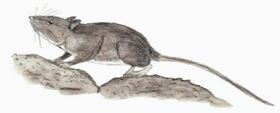Biology:Lava mouse
| Lava mouse Temporal range: Late Pleistocene-Holocene
| |
|---|---|

| |
| A life restoration of a lava mouse | |
| Scientific classification | |
| Domain: | Eukaryota |
| Kingdom: | Animalia |
| Phylum: | Chordata |
| Class: | Mammalia |
| Order: | Rodentia |
| Family: | Muridae |
| Tribe: | Murini |
| Genus: | †Malpaisomys Hutterer, Lopez-Martinez & Michaux, 1988 |
| Species: | †M. insularis
|
| Binomial name | |
| †Malpaisomys insularis Hutterer, Lopez-Martinez & Michaux, 1988
| |
The lava mouse (Malpaisomys insularis) is an extinct endemic rodent from the Canary Islands, Spain .[1] It is the only species in the genus Malpaisomys.
The lava mouse is known from Holocene and Pleistocene deposits in the eastern Canary Islands, including Fuerteventura, Lanzarote, and nearby islets. Radiocarbon dates indicate that it became extinct after the European arrival in the archipelago sometime after 1270 AD, probably due to the introduction of rats.[2]
A study of its skeletal characteristics suggested that the lava mouse lived in fissures opened in the lava fields.[3] The morphology of its teeth indicates that it was an herbivore.[3]
Its evolutionary relationships were unresolved due to its fairly generic morphology. Rodents on islands generally increase in size during the course of their evolution (see also insular gigantism); the lava mouse was fairly small for an insular rodent (some 20 cm in overall length).[3] Thus, it is more likely than not that it evolved from small Pliocene mainland genera Paraethomys, Occitanomys, or relatives thereof, than being a later derivative of the Deomyinae.[4] A 2012 genomic study recovered it as a highly divergent lineage within the genus Mus sensu lato most closely related to Coelomys.[5]
This rodent owes its name Malpaisomys to the Spanish word malpaís ("badlands"), denoting the lava fields where its fossil remains are sometimes found in cavities.
See also
- Canariomys
- List of extinct animals
- List of extinct animals of Europe
References
- ↑ Hutterer, Rainer; Lopez-Martinez, Nieves; Michaux, Jacques (1988). "A new rodent from Quaternary deposits of the Canary Islands and its relationships with Neogène and recent murids of Europe and Africa". Palaeovertebrata 18 (4): 241-262. https://palaeovertebrata.com/articles/view/339.
- ↑ Rando, Juan Carlos; Alcover, Josep Antoni; Navarro, Juan Francisco; García-Talavera, Francisco; Hutterer, Rainer; Michaux, Jacques (September 2008). "Chronology and causes of the extinction of the Lava Mouse, Malpaisomys insularis (Rodentia: Muridae) from the Canary Islands" (in en). Quaternary Research 70 (2): 141–148. doi:10.1016/j.yqres.2008.04.012. ISSN 0033-5894. Bibcode: 2008QuRes..70..141R. https://www.cambridge.org/core/journals/quaternary-research/article/abs/chronology-and-causes-of-the-extinction-of-the-lava-mouse-malpaisomys-insularis-rodentia-muridae-from-the-canary-islands/A9FFF596A9950971D0FE3DD5286C26E8.
- ↑ 3.0 3.1 3.2 Boye, Peter; Hutterer, Rainer; López-Martínez, Nieves; Michaux, Jacques (1992). "A reconstruction of the Lava mouse (Malpaisomys insularis), an extinct rodent of the Canary Islands". Zeitschrift für Säugetierkunde 57: 29–38. https://www.biodiversitylibrary.org/part/192037.
- ↑ Renaud, Sabrina; Michaux, Jacques (December 2004). "Parallel evolution in molar outline of murine rodents: the case of the extinct Malpaisomys insularis (Eastern Canary Islands)". Zoological Journal of the Linnean Society 142 (4): 555–572. doi:10.1111/j.1096-3642.2004.00140.x.
- ↑ Pagès, Marie; Chevret, Pascale; Gros-Balthazard, Muriel; Hughes, Sandrine; Alcover, Josep Antoni; Hutterer, Rainer; Rando, Juan Carlos; Michaux, Jacques et al. (2012-02-21). "Paleogenetic Analyses Reveal Unsuspected Phylogenetic Affinities between Mice and the Extinct Malpaisomys insularis, an Endemic Rodent of the Canaries" (in en). PLOS ONE 7 (2): e31123. doi:10.1371/journal.pone.0031123. ISSN 1932-6203. PMID 22363563. Bibcode: 2012PLoSO...731123P.
External links
Wikidata ☰ Q256811 entry
 |

